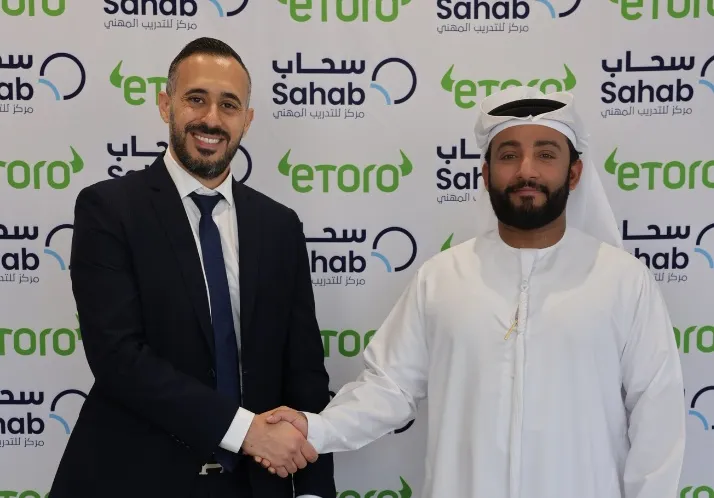EToro brings crypto learning into UAE classrooms
'We need to teach wallets, custody, and security,' says expert, highlighting gaps in today’s school finance lessons

Students in the UAE are set to trade before they graduate. Dubai-based Sahab School has signed a strategic agreement with eToro to integrate its trading platform into the curriculum, giving teenagers hands-on experience with financial markets.
The initiative, launched earlier this month, aligns with the UAE Vision 2031 plan to strengthen financial literacy and digital skills. The partnership aims to “empower communities with the tools they need to grow their knowledge, wealth, and support financial education at a local level,” said George Naddaf, Regional Manager at eToro MENA.
The collaboration also “provides learners with the tools to navigate rapidly evolving financial markets confidently,” said Saif Al Naqbi, Founder and CEO of Sahab School.
The school, established under his leadership, specializes in financial education for both youth and adults. It positions itself as a national centre for financial literacy, offering certified programmes in Arabic on budgeting, saving, investing, and entrepreneurial skills to inspire a new generation of financially literate individuals.

From left, George Naddaf, Regional Manager, eToro MENA; with Saif Yousif Al Naqbi, Founder & CEO of Sahab School. Photo: eToro
The importance of financial literacy
The move reflects a wider concern: students often leave school without practical money skills. Experts stress that financial literacy, including lessons on crypto, is now essential for navigating today’s markets.
“Learning how to use real trading platforms can help students understand the concepts of volatility, profit, and loss,” Gui Bibeau, Head of Education at Solana Foundation, told The Crypto Radio.
“Exploring the potential traps and pitfalls in an educational setting lets students avoid bad advice from grifters and influencers and instead receive proper training from well-intentioned instructors.”
Institutions and the classroom
Bibeau noted that business schools stand to gain by incorporating digital assets into their curricula, an area where fintech firms already hold a forward-looking advantage. “Institutions must stay current in what they teach to ensure their students are onboarded into this fast-moving new reality of digital assets,” he said.
Pekka Kelkka, web3 advisor and educator, believes it’s important to understand the fundamentals of decentralized technology, cryptocurrencies, stocks, bonds, and commodities through broadening the education scope and not depend on a single platform or source of information.
“Before you do any trades or transactions, you need to understand the asset itself, how it functions, its role, and capabilities as described in whitepapers,” Kelkka told The Crypto Radio.
Despite how many trading platforms “have good mechanisms to educate people, do your own research as much as you can, go to events, ask people, and understand what this technology is all about and why it actually came live,” he stressed.
Teaching before the rules catch up
Bibeau proposed concepts like interest, collateral, risk profile, and active vs passive investing as starting points. I “think the struggle is meeting students at the level where they are,” he noted.
He also stressed the importance of including crypto education in institutions without waiting for digital assets to fully be regulated. “Alongside regular finance education, crypto and digital assets have an extra level of knowledge to include. We need to teach a few basics like wallets, custody and security,” he said.
For Kelkka, big moves such as BlackRock’s entry into crypto markets created a domino effect that forced regulatory clarity, leading other giant asset managers to follow. However, “patience is key, considering the volatility of many assets.”
“Defined policy is safe for newbies to make sure that the platform you want to trade and transact your cryptos is regulated in your jurisdiction,” Kelkka said, citing examples like Dubai’s Virtual Assets Regulatory Authority and other regulatory bodies in the U.S.
How to track financial literacy gains
When it comes to crypto education, Bibeau explained how the nature of decentralized platforms offers a level of anonymity where there is no full monitoring or analytics since people transact with cryptographic addresses.
“Our own criterion at Solana generally focuses on attendance and readership of our educational material,” he said.
“If somebody was interested in performing a study of financial literacy, we would have to track willing participants and analyze their investing behaviour over the course of many years,” he explained.
With eToro’s partnership with Sahab School boosting financial literacy and preparing students for evolving markets, experts stress the importance of understanding digital assets, regulations, and risk to build informed and confident future investors.




